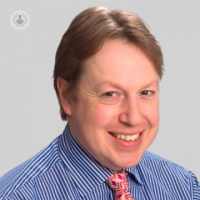Insights into paediatric plastic surgery
Written by:In his latest online article, Mr Guy Thorburn gives us his insights into paediatric plastic surgery. He talks about what it is, the most common reasons children undergo these procedures, the different types of surgeries performed, how plastic surgeons address unique challenges and the potential risks and complications.

What is paediatric plastic surgery, and what are the common reasons children undergo these procedures?
Paediatric plastic surgery covers the branch of surgery that involves reconstruction in children. It therefore deals with form and function, but embraces a friendly, caring approach that is important for children and their families. There also tends to be a focus on long-term outcomes and understanding how treatments will work as children grow.
These approaches help to reduce anxiety and build a strong rapport with the children and their families. They also provide important lessons for providing ideal plastic surgery care to adults.
Could you provide an overview of the different types of paediatric plastic surgeries commonly performed?
There are three main categories: congenital differences and birthmarks (such as cleft lip and palate; hypospadias; ear anomalies; extra fingers/toes; haemangiomas and vascular birthmarks).
Injuries and resultant scarring, or problem scarring from other types of operation (especially visible or problem scarring); and skin lumps and bumps (such as cysts, moles, lipomas - these tend to be in older children and young adults).
How do plastic surgeons address the unique challenges and considerations involved in performing pediatric plastic surgery?
The first step is extensive experience and specialist training in paediatric surgery, alongside working with specialist paediatric anaesthetists and nurses.
It is crucial to recognise how stressful it can be for parents when their child is having an operation, and to provide support to them as well as the child.
It is also important to have a long-term understanding of how conditions can impact children at different ages and as they grow up. This can be the medical impact, but also the wider impact such as schooling, social development and friendship groups, developing confidence and resilience. For children with visible differences, these can be especially important considerations when deciding about surgery.
What are the potential risks and complications associated with paediatric plastic surgery, and how do surgeons prioritise safety and optimise outcomes for children?
There are general risks for any surgery in adults or children. And for specific procedures there will be certain additional risks that it is important to discuss in advance. It is important to remember that for most of the treatments we are talking about, the overall risks are very low, and the general anaesthetics risks are extremely low. This is largely because we are very fussy about safety and optimising the situation to avoid risks.
A particular issue in paediatric plastic surgery is deciding, with the families, on the best timing for a particular treatment. These can be tricky decisions. As parents will know, children go through different developmental stages. During some of these stages, such as the “terrible two-some’s”, the process of surgery and the recovery period can be more stressful for children, so we will often try to avoid particular stages. For older children, there may be exam periods, or changes of schools, that we would want to plan around.
Mr Guy Thorburn is a distinguished adult and paediatric surgeon with over 25 years of experience. You can schedule an appointment with Mr Thorburn on his Top Doctors profile.


